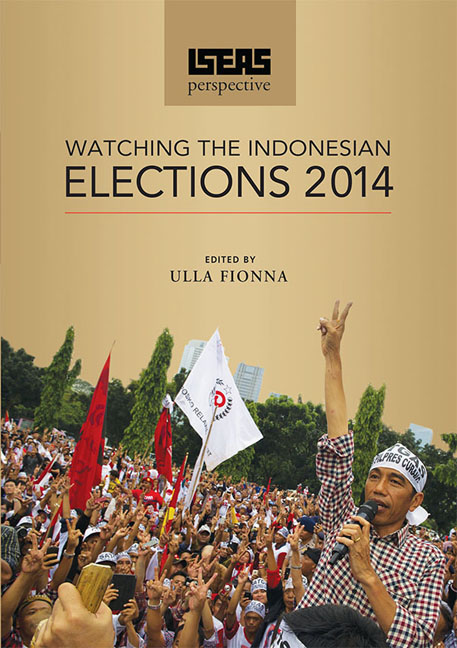Book contents
- Frontmatter
- Contents
- Foreword
- Introduction
- 1 The Gubernatorial Race in Jakarta: Background and Implications
- 2 Indonesian Parties Struggle for Electability
- 3 Who Will Be Indonesian President in 2014?
- 4 Indonesian Presidential Election Forcing Rejuvenation of Parties
- 5 Resisting Democracy: Front Pembela Islam and Indonesia's 2014 Elections
- 6 Getting to Know the Contestants of the 2014 Indonesian Parliamentary Elections
- 7 A Snapshot of the Campaigning in Indonesia's 2014 Legislative Elections
- 8 Unpacking the Results of the 2014 Indonesian Legislative Elections
- 9 Indonesia's 2014 Legislative Elections: The Dilemmas of “Elektabilitas” Politics
- 10 The Islamic Factor in the 2014 Indonesian Elections
- 11 Vote-buying in Indonesia's 2014 Elections: The Other Side of the Coin
- 12 Gap Narrows Between Candidates in Indonesian Presidential Elections
- 13 Analysing the Economic Platforms in the Indonesian Presidential Election
- 14 Indonesian Islamic Parties After the 2014 Elections: Divided and Self-Centred
- 15 Safeguarding Indonesia's Pluralism: An Essential Task for Joko Widodo
- 16 Jokowi's Key Economic Challenge: Improving Fiscal Policy for Equitable Growth
- 17 Crossing the River While Avoiding the Stones: Jokowi's Run-up to the Presidency
- 18 Post-elections Indonesia: Towards a Crisis of Government?
- Epilogue: Jokowi's First Months: Compromise Cabinet, Subsidy Cuts, and Corrupt Coalition
7 - A Snapshot of the Campaigning in Indonesia's 2014 Legislative Elections
Published online by Cambridge University Press: 29 July 2017
- Frontmatter
- Contents
- Foreword
- Introduction
- 1 The Gubernatorial Race in Jakarta: Background and Implications
- 2 Indonesian Parties Struggle for Electability
- 3 Who Will Be Indonesian President in 2014?
- 4 Indonesian Presidential Election Forcing Rejuvenation of Parties
- 5 Resisting Democracy: Front Pembela Islam and Indonesia's 2014 Elections
- 6 Getting to Know the Contestants of the 2014 Indonesian Parliamentary Elections
- 7 A Snapshot of the Campaigning in Indonesia's 2014 Legislative Elections
- 8 Unpacking the Results of the 2014 Indonesian Legislative Elections
- 9 Indonesia's 2014 Legislative Elections: The Dilemmas of “Elektabilitas” Politics
- 10 The Islamic Factor in the 2014 Indonesian Elections
- 11 Vote-buying in Indonesia's 2014 Elections: The Other Side of the Coin
- 12 Gap Narrows Between Candidates in Indonesian Presidential Elections
- 13 Analysing the Economic Platforms in the Indonesian Presidential Election
- 14 Indonesian Islamic Parties After the 2014 Elections: Divided and Self-Centred
- 15 Safeguarding Indonesia's Pluralism: An Essential Task for Joko Widodo
- 16 Jokowi's Key Economic Challenge: Improving Fiscal Policy for Equitable Growth
- 17 Crossing the River While Avoiding the Stones: Jokowi's Run-up to the Presidency
- 18 Post-elections Indonesia: Towards a Crisis of Government?
- Epilogue: Jokowi's First Months: Compromise Cabinet, Subsidy Cuts, and Corrupt Coalition
Summary
INTRODUCTION
Since 16 March, Indonesia has been in full campaign mode for its 2014 elections. This year's are the fourth legislative and the third direct presidential elections conducted after the country underwent its transition to democracy in 1998. The official campaign period for the national, provincial, and district-level legislative elections will continue until 5 April. After a cooling off period lasting a few days (minggu tenang), polling will take place on 9 April.
New methods are shaping the 2014 campaigns, especially at the grassroots level. First, parties are showing preference for the use of blusukan conducted by candidates to meet with individual voters. Literally meaning going through places in which passage is difficult (crowds, scrubs, narrow alleys, etc.), blusukan is now seen as an essential mode of campaign. This method is supposed to help voters to get to know their candidate at a more personal level. Voters can look for particular personal attributes, while candidates can show that they genuinely care about individual voters’ concerns. Second, although money politics remains an integral part of the campaign approach, the way parties rely on it has changed. The cost of mobilizing voters for mass rallies (pawai) have become more expensive, and parties are now more careful about spending the money on them. Consequently, there are now less rallies and they are only reserved for visits by high-profile leaders. Furthermore, as most parties would be doing the same thing, any advantage that any party may gain from luring supporters with money is cancelled out. As such, money no longer has the kind of power it used to have for buying votes. The role that money will play on the polling day remains unclear.
THE INCREASING POPULARITY OF BLUSUKAN
In past elections, parties preferred a mass mobilization of members and supporters. They typically held mass rallies to draw supporters, usually by staging live music and other kinds of entertainment. This year things have clearly changed. Although parties still conduct these rallies, they are fewer in numbers, and are smaller. Rather, the most interesting aspect in this year's campaign is how the methods generally adopted by most political parties and legislative candidates (calon legislative or calegs) to reach potential voters within their legislative districts (daerah pemilihan or dapil) have changed.
- Type
- Chapter
- Information
- ISEAS PerspectiveWatching the Indonesian Elections 2014, pp. 54 - 61Publisher: ISEAS–Yusof Ishak InstitutePrint publication year: 2015



